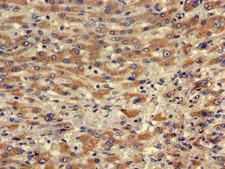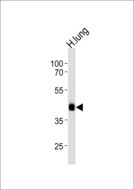order histories, retained contact details for faster checkout, review submissions, and special promotions.
Forgot password?
order histories, retained contact details for faster checkout, review submissions, and special promotions.
Locations
Orders Processing,
Shipping & Receiving,
Warehouse
2 Shaker Rd Suites
B001/B101
Shirley, MA 01464
Production Lab
Floor 6, Suite 620
20700 44th Avenue W
Lynnwood, WA 98036
Telephone Numbers
Tel: +1 (206) 374-1102
Fax: +1 (206) 577-4565
Contact Us
Additional Contact Details
order histories, retained contact details for faster checkout, review submissions, and special promotions.
Forgot password?
order histories, retained contact details for faster checkout, review submissions, and special promotions.
MTRF1
Mitochondrial Translational Release Factor 1
MTRF1 was determined by in silico methods to be a mitochondrial protein with similarity to the peptide chain release factors (RFs) discovered in bacteria and yeast. The peptide chain release factors direct the termination of translation in response to the peptide chain termination codons. Initially thought to have a role in the termination of mitochondria protein synthesis, a recent publication found no mitochondrial translation release functionality. Multiple alternatively spliced transcript variants have been suggested by mRNA and EST data; however, their full-length natures are not clear.
| Gene Name: | Mitochondrial Translational Release Factor 1 |
| Synonyms: | MTRF1, MRF-1, MtRF-1, MRF1, MTTRF1, RF1 |
| Target Sequences: | NM_004294 NP_004285.2 O75570 |


If you do not find the reagent or information you require, please contact Customer.Support@LSBio.com to inquire about additional products in development.









